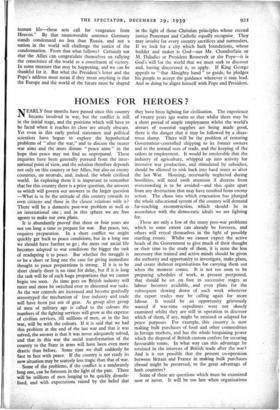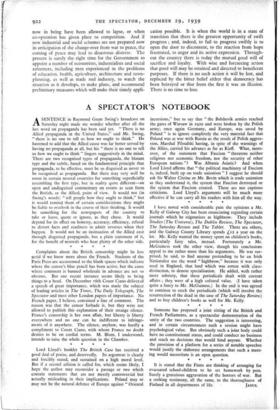HOMES FOR HEROES ?
NEARLY four months have passed since this country became involved in war, but the conflict is still in the initial stage, and the positions which will have to be faced when it reaches its close are utterly obscure. Yet even in this early period statesmen and political scientists have begun to explore the hypothetical problems of " after the war," and to discuss the nearer war aims and the more distant " peace aims " in the hope that peace may not find us unprepared. These inquiries have been generally pursued from the inter- national point of view, and the solution therefore depends not only on this country or her Allies, but also on enemy countries, on neutrals, and, indeed, the whole civilised world. In exploring them it is important to remember that for this country there is a prior question, the answers to which will govern our answers to the larger question —What is to be the attitude of this country towards its own citizens and those in the closest relations with it? There will be a domestic post-war problem as well as an international one ; and in this sphere we are free agents to make our own plans.
It is abundantly proved that three or four years are not too long a time to prepare for war. But peace, too, requires preparation. In a short conflict we might quickly get back to peace conditions, but in a long one we should have further to go ; the more our social life becomes adapted to war conditions the bigger the task of readapting it to peace. But whether the struggle is to be a short or long one the case for giving immediate thought to peace preparations is strong. If it is to be short clearly there is no time for delay, but if it is long the task will be of such huge proportions that we cannot begin too soon. As time goes on British industry will more and more be switched over to abnormal war tasks. As the war controls are increased and become gradually stereotyped the mechanism of free industry and trade will have been put out of gear. As group after group of men of military age is called to the colours the numbers of the fighting services will grow at the expense of civilian services, till millions of men, as in the last war, will be with the colours. If it is said that we had this problem at the end of the last war and that it was solved, the answer is that it was never adequately solved, and that in this war the social transformation of the country to the State in arms will have been even more drastic than before. Some time we shall suddenly be face to face with peace. If the country is not ready its new situation may be scarcely less tragic than that of war. Some of the problems, if the conflict is a moderately long one, can be foreseen in the light of the past. There will be millions of men longing to be quickly demobi- lised, and with expectations raised by the belief that they have been fighting for civilisation. The experience of twenty years ago warns us that whilst there may be a short period of ample employment whilst the world's arrears of essential supplies are being made good, there is the danger that it may be followed by a disas- trous slump. There will be the problem of restoring Government-controlled shipping to its former owners and to the normal uses of trade, and the keeping of the sailors in employment. It would be intolerable that the industry of agriculture, whipped up into activity for intensive war production, and stimulated by subsidies, should be allowed to sink back into hard times as after the last War. Housing, necessarily neglected during hostilities, will need swift attention if distress from overcrowding is to be avoided—and this quite apart from any destruction that may have resulted from enemy action. The chaos into which evacuation has plunged the whole educational system of the country will demand far-reaching reconstruction, which should be in accordance with the democratic ideals we are fighting for.
These are only a few of the many post-war problems which to some extent can already be foreseen, and others will reveal themselves in the light of possibly startling events. Whilst we cannot expect the active heads of the Government to give much of their thought or their time to the study of them, it is none the less necessary that trained and active minds should be given the authority and opportunity to investigate, make plans, and create skeleton organisations for carrying them out when the moment comes. It is not too soon to be preparing schedules of work, at present postponed, that should be set on foot in successive stages as labour becomes available, and even plans for the subsequent slowing down of such work whenever the export trades may be calling again for more labour. It would be an opportunity grievously wasted if war-time expedients were not closely examined whilst they are still in operation to discover which of them, if any, might be retained or adapted for peace purposes. For example, this country is now making bulk purchases of food and other commodities in foreign markets, and has the whole bargaining power which the disposal of British custom confers for securing favourable terms. In what way can this advantage be retained in the interests of British trade after the war? And is it not possible that the present co-operation between Britain and France in making bulk purchases abroad might be preserved, to the great advantage of both countries?
Some of these are questions which must be examined now or never. It will be too late when organisations now in being have been allowed to lapse, or when co-operation has given place to competition. And if new industrial and social schemes are not prepared now in anticipation of the change-over from war to peace, the coming of peace may lead to disastrous distress. The present is surely the right time for the Government to appoint a number of economists, industrialists and social reformers, including men experienced in the problems of education, health, agriculture, architecture and town- planning, as well as trade and industry, to watch the situation as it develops, to make plans, and recommend preliminary measures which will make their timely appli- cation possible. It is when the world is in a state of transition that there is the greatest opportunity of swift progress ; and, indeed, to fail to progress swiftly is to open the door to discontent, to the reaction from hope frustrated, to anger and its active expression. Through- out the country there is today the mutual good will of sacrifice and loyalty. With wise and foreseeing action that good will may be retained and directed to beneficent purposes. If there is no such action it will be lost, and replaced by the bitter belief either that democracy has been betrayed or that from the first it was an illusion. There is no time to lose.































 Previous page
Previous page